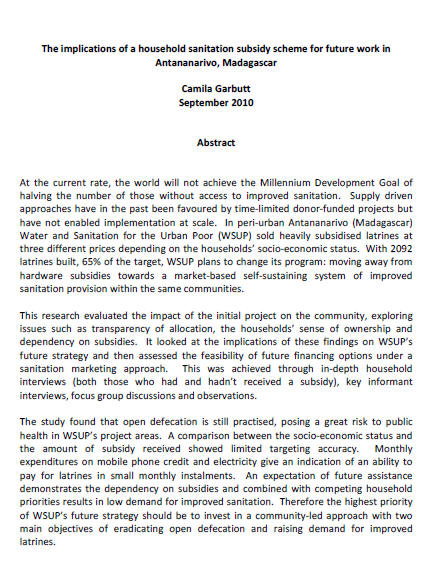The implications of a household sanitation subsidy scheme for future work in Antananarivo
 |
rapport Sep 2010 ; 40 pages
Aut. Camila Garbutt
Ed. WSUP - London
Téléchargeable sous format: PdF
Téléchargeable chez l'éditeur
Abstract:
This research evaluated the impact of the initial project on the community, exploring issues such as transparency of allocation, the households’ sense of ownership and dependency on subsidies. It looked at the implications of these findings on WSUP’s future strategy and then assessed the feasibility of future financing options under a sanitation marketing approach. This was achieved through in-depth household interviews (both those who had and hadn’t received a subsidy), key informant interviews, focus group discussions and observations.
The study found that open defecation is still practised, posing a great risk to public health in WSUP’s project areas. A comparison between the socio-economic status and the amount of subsidy received showed limited targeting accuracy. Monthly expenditures on mobile phone credit and electricity give an indication of an ability to pay for latrines in small monthly instalments. An expectation of future assistance demonstrates the dependency on subsidies and combined with competing household priorities results in low demand for improved sanitation. Therefore the highest priority of WSUP’s future strategy should be to invest in a community-led approach with two main objectives of eradicating open defecation and raising demand for improved latrines.
Mots clefs: |
assainissement (CI) (DT) (OP) (ope) , prospective (CI) (DT) (OP) (ope) , toilettes, latrine (CI) (DT) (OP) (ope) |
Pays concerné: |
Editeur/Diffuseur: |
|
WSUP
-
Water and Sanitation for the Urban Population - London - Royaume Uni |
En cas de lien brisé, nous le mentionner à communication@pseau.org